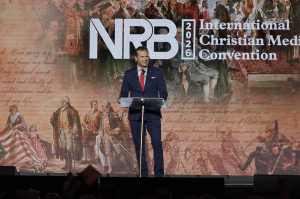Supreme Court Hears Case That Could Make TV Obscenity Accessible to Children
Is public television overly regulated and discriminated against in the age of red tape-free cable TV and Internet?
The U.S. Supreme Court heard oral arguments Tuesday in a case that could loosen regulation on the amount of vulgar language and nudity that is broadcast on public television between the hours of 6 a.m. and 10 p.m., a time when many children are tuned in.
Television stations ABC and Fox asked the Supreme Court to drop a Federal Communications Commission (FCC) policy that punishes stations for broadcasting spontaneous vulgar language and nudity. The stations claim they are being unfairly regulated, which impinges on their business, especially when they try to compete with unregulated cable network channels. The questions of fairness and free speech were raised, based on instances of fines from the FCC.
ABC had been punished with a $1.4 million fine after showing the bare bottom of actress Charlotte Ross in a 2003 episode of "NYPD Blue." Fox got into trouble because of Cher, who used an expletive during the Billboard Music Awards in Dec. 2002, and for a similar case involving reality show personality Nicole Richie, The Wall Street Journal reported.
Lower courts reportedly found the FCC's decisions inconsistent and said they might constitute a threat to the First Amendment right to free speech. The stations also reportedly argue that the guidelines provided by the FCC are too vague and inconsistent for them to follow.
But Chris Gacek, senior fellow at Family Research Council (FRC) told The Christian Post Tuesday that one does not need to be "a rocket scientist" to figure out that a scene like the one in ABC's show was "going to get you in trouble." The scene showing the bare bottom was scripted and pre-pondered, he told CP. ABC reportedly argued that the episode was not indecent because the bottom was not a "sexual organ" and there was no frontal nudity).
Gacek also told CP in November that he sympathizes with the belief that the cable networks should be treated the same as the broadcast networks, but would prefer increased regulation of the cable networks rather than decreased regulation of the broadcast networks. He also said he believes that the broadcast networks should be set aside as a place where consumers know they can watch TV without inadvertently being exposed to indecency.
"With all these cable channels where you can go, there ought to be someplace you can go that is OK. You can show this junk all over the place. So, what is the problem with having one area that is not subject to all the intrusions and unwanted content that people find offensive? The broadcaster ought to be like a safe harbor," Gacek implored at the time.
Many fear that if the Supreme Court sides with the broadcasters, public television content aired at times easily accessible to children will become a lot racier.
Dan Isett, Director of Public Policy at the Parents Television Council, told CP Tuesday that if the court sided with the networks completely, there would no longer be any safeguards in terms of content on the publicly owned airwaves "at the times when we know millions of children are watching."
"It would essentially be turning broadcast television, and radio for that matter, into HBO and the type of content you might see there," Isett said.
The public stations are more strongly regulated compared to private channels, because they also have greater privileges, Isett told CP. They operate with a free license to use the publicly owned airwaves worth tens of billions of dollars, he explained.
"So it’s perfectly reasonable for the government, or the people, to expect certain conditions to be met as part of that license, and not airing indecent material in front of kids is one of them," he told CP.
There is no possibility of free speech violation in this case, Isett argues, because the broadcasters are free to air indecent content, as long as it is after 10 p.m. The issue in this case is whether the broadcasters will have the ability to air unlimited amounts of indecent material at times when kids are likely to be in front of TV sets.
Such content can prove harmful to young children, experts warn. The Parents Television Council has conducted extended research analyzing what young people in the U.S. watch and what influence TV content has on them. The organization's goal is to shield children from potentially harmful content.
The court's decision is expected to come in June and it is hard to predict what it the justices will decide.
Andrew Jay Schwartzman, Senior Vice President of Media Access Project, was present at the hearing. Schwartzman told CP that the likely outcome is that the justices will leave the "Pacifica decision" in place and decide whether or not the cases before it are permissible or not under that important standard.
In FCC vs. Pacifica Foundation, a 1973 case, the Supreme Court ruled that the government has an interest in shielding children from patently offensive material, and ensuring that unwanted speech does not enter one's home. The decision gave FCC the power to regulate broadcast indecency during the hours of 6 a.m. and 10 p.m., when children are likely to be among viewers.
If the justices side with broadcasters, the FCC could be forced to start from scratch in crafting indecency enforcement rules and toss thousands of complaints similar to the Fox "fleeting expletives case," The Wall Street Journal reported.
Pending cases concerning broadcast indecency involve actress Diane Keaton's use of an expletive on ABC's "Good Morning America" in 2007 and several episodes of the Fox cartoon "Family Guy," according to the Journal.
The commission mostly stopped issuing indecency fines in 2006 after Fox, ABC and CBS Corp. sued over the issue. Since then, more than 1.2 million indecency complaints have piled up at the FCC awaiting court resolution.



























